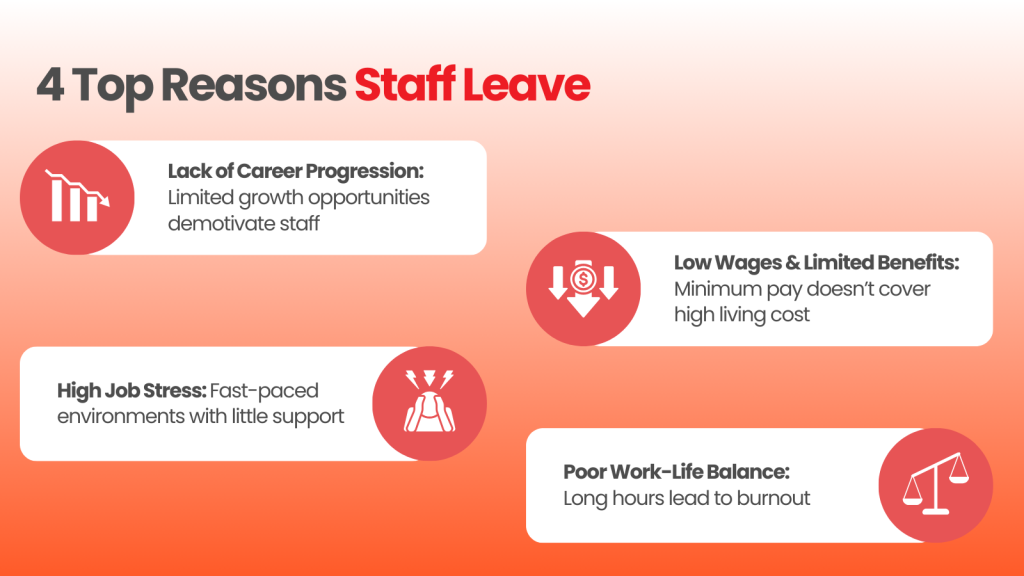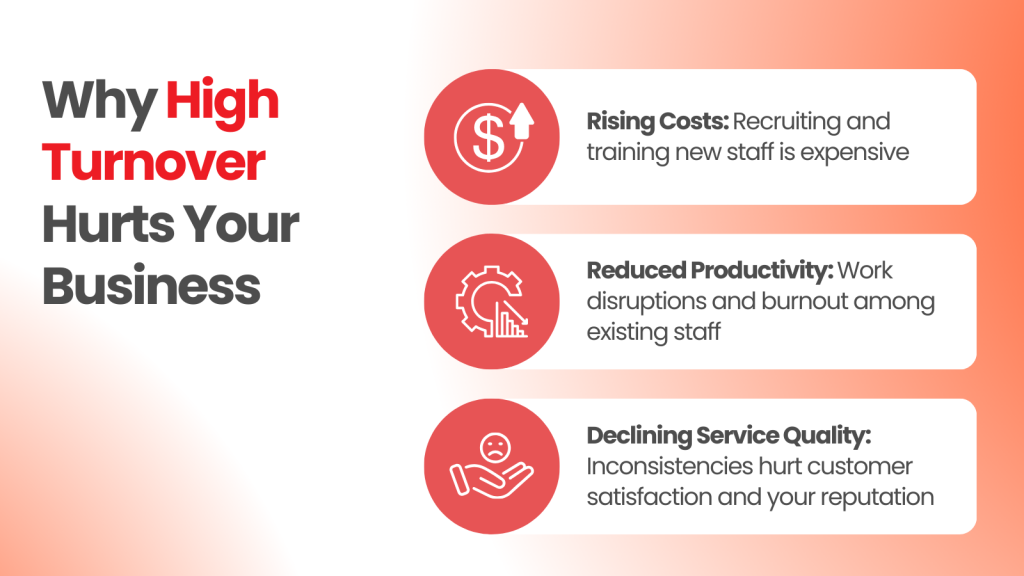Top 4 Causes of High Turnover in Hospitality & How to Retain Your Best Staff
Holland Team
March 19, 2025High staff turnover has long been a challenge for hospitality businesses in Ireland. With turnover rates surpassing 30%—one of the highest in the EU—the financial and operational impacts are significant. High turnover affects revenue, customer satisfaction, and service quality, all of which are critical in an industry that relies on top-notch service. Employers must understand why turnover is so high and implement effective strategies to retain their best talent.

In this article, we explore the primary causes of high staff turnover in hospitality and provide actionable strategies to improve retention. By addressing these issues, your hospitality business can create a productive workplace that attracts and retains skilled employees, enhances morale, and boosts productivity.
Reasons for turnover

Following the working experience and solving the problem to the customer, Edusafe was find out reasons that have impact on turnover, include:
- Low Wages and Limited Benefits:
Many hospitality roles offer only minimum wage or slightly above, especially for entry-level positions like wait staff, housekeeping, and kitchen assistants. Ireland’s minimum wage, set at €12.90 per hour in 2024, often fails to cover the high cost of living in cities like Dublin and Cork. Limited benefits, such as lack of health insurance or retirement plans, also lead workers to look elsewhere for higher-paying jobs with better support. Competitive wages and benefits packages can play a critical role in reducing turnover.
- Poor Work-Life Balance
Hospitality workers frequently work long shifts, weekends, and holidays, which can strain their personal lives. Without sufficient time for rest and family, burnout becomes common, making it challenging for employees to maintain a work-life balance. Flexible scheduling options can help address this challenge and reduce turnover.
- Lack of Career Progression and Training Opportunities
In the hospitality industry, many employees feel stuck in roles without opportunities for advancement. According to Fáilte Ireland’s 2023 report, over 60% of hospitality employees report limited growth opportunities in their current roles. Providing clear pathways for career progression—like training programs that help a line cook advance to a kitchen supervisor or leadership workshops for front-desk staff—can significantly boost employee retention and loyalty.
- High Job Stress and Inadequate Support
The fast-paced nature of hospitality leads to high stress, especially during peak seasons like summer tourism, the December holidays, and major events. Hotel staff handle constant check-ins, while restaurant teams manage back-to-back reservations. Limited staffing and poor management practices compound this stress, causing employees to feel unsupported. The Irish Hospitality Institute identifies workplace stress as a primary cause of turnover. Effective recruitment and onboarding of new hires ahead of peak seasons can help balance workloads and reduce burnout among current staff.
The Impact of High Turnover on Hospitality Businesses

1. Increased Recruitment and Training Costs:
Constant recruitment and training of new staff are costly. Processes like job postings, interviews, and fast employee onboarding can cost up to €3,500 per hire in hospitality. Streamlining the onboarding process helps reduce these costs and improve new hire readiness.
2. Decreased Productivity and Efficiency:
When experienced staff leave, remaining employees often shoulder extra work, leading to burnout and lowered productivity. High turnover disrupts workflow as new hires need time to adjust, reducing overall efficiency. Implementing effective hospitality staff onboarding can help new employees integrate faster, minimising productivity loss.
3. Strain on Management and Leadership:
With high turnover, management juggles hiring, training, and daily operations, which can prevent focus on long-term strategy and increase burnout risk. Retention strategies for hospitality can ease this burden by fostering a stable, well-trained team that requires less frequent replacement.
4. Reduced Employee Morale and Engagement:
High turnover can destabilise the work environment, lowering morale among remaining employees. Weakened team cohesion can lead to disengagement and additional turnover. Fostering a positive workplace culture is essential to retaining a cohesive team and supporting retention strategies for hospitality businesses.
5. Negative Impact on Customer Satisfaction:
Quality service is crucial in hospitality. Frequent staff changes create inconsistencies, affecting customer satisfaction and risking loyal clients. Regular employees build customer rapport, which is hard to achieve with constant turnover.
6. Damage to Brand Reputation:
In a competitive market, a strong brand reputation is essential. High turnover can lead to negative customer experiences and reviews, harming the company’s reputation and online presence. This, in turn, makes attracting top talent harder, perpetuating the turnover cycle.
High turnover rates clearly provide considerable issues for hotels, restaurants, and all other hospitality-related enterprises, as seen by these noteworthy repercussions. In order to effectively tackle this issue, hospitality organisations need to implement strategic initiatives that are customised to their specific settings. Edusafe will offer tips on how to deal with staff turnover in your company in the next section.
Effective Strategies to Reduce Turnover in Hospitality

To combat high turnover, hospitality businesses can implement these proven strategies:
1. Effective Onboarding Processes
A well-structured hospitality staff onboarding process helps new hires become productive quickly, minimising disruptions and supporting a consistent workflow. Fast employee onboarding ensures new team members can contribute effectively from day one, reducing the strain on existing staff and boosting operational efficiency.
2. Opportunities for Career Advancement
Providing structured training programs and clear paths for career progression—such as mentorships and funding for further education—motivates employees to remain engaged and committed to the organisation. When employees see opportunities to grow within the company, they are more likely to stay long-term.
3. Competitive Compensation and Benefits
Regularly reviewing and adjusting pay scales to align with industry standards and the cost of living can enhance loyalty. Additional benefits, like health insurance and retirement plans, also contribute to employee satisfaction and make them less likely to seek work elsewhere.
4. Supporting Work-Life Balance and Positive Culture
A healthy work-life balance and a supportive, team-oriented culture are essential to retaining staff. Flexible scheduling, regular breaks, team-building activities, and open recognition foster a workplace where employees feel valued and engaged. A positive environment reduces burnout, improves morale, and encourages long-term commitment.
Simplifying Turnover Challenges in the Hospitality Industry
Reducing turnover requires a consistent, structured approach to training and onboarding. EduSafe offers a solution tailored for hospitality staff onboarding, equipping new employees to be confident, effective team members from day one.
Key Features of EduSafe:
1. Standardised Online Onboarding Program:
Boosts new hire productivity by up to 75% and enhances retention rates by 69% through a consistent, engaging onboarding experience.
2. Custom Training Modules:
Incorporates gamification and problem-based scenarios, allowing new hires to practice real-life hospitality challenges while supporting skill-building for career progression.
3. Automatic Tracking:
Tracks progress and completion automatically, giving managers insights to continually improve training and onboarding effectiveness.
Transform high turnover into high performance with EduSafe’s hospitality staff onboarding solutions. Schedule a demo today to see how EduSafe can help your hospitality business retain staff and enhance service quality from day one.
EduSafe is more than just an onboarding software—it’s a trust partner in turning turnover into opportunity, driving efficiency, and elevating performance in the hospitality sector! Visit EduSafe to learn more and schedule a demo today.





